- History / Culture
- Gourmet
- Hot Springs
Japan's Oldest Hot Spring Town with a Modern Twist
Contributor : Kristina
In the northern part of Kobe City, Hyogo Prefecture, lies Arima Onsen, one of Japan’s most renowned hot spring resorts. Alongside Dogo Onsen and Shirahama Onsen, it holds the prestigious title of being one of the "Three Ancient Springs of Japan" (Nihon sankotoh). This place was mentioned even in Japan’s oldest compilation of poems, Man’yoshu and records of Ancient Matters, Kojiki. Today, I want to take you to Arima Onsen to experience Japan's ancient history and see how it has changed over the centuries.
By the way, for hot spring lovers, be sure to read my other article on staying in Kinosaki Onsen—another onsen town in vast Hyogo Prefecture.
Access from Kobe, Osaka, and Kyoto
Despite its tranquil atmosphere, Arima Onsen is surprisingly accessible from the main urban centers. Depending on your mode of transport, the journey from Sannomiya Station in Kobe takes approximately 25 to 45 minutes, while the trip from Osaka takes less than 1 hour. For more detailed route information, please visit the official website.
The Ancient Origins of Arima Onsen
The earliest recorded mention of Arima Onsen dates back to the 7th century, during the reign of Emperor Jomei, who visited the onsen to recover from an illness. Over the centuries, Arima Onsen became a favored retreat for emperors, aristocrats, and samurai seeking the healing powers of its mineral-rich waters. The town became a recreation and spiritual rejuvenation city, always welcoming visitors from across Japan.
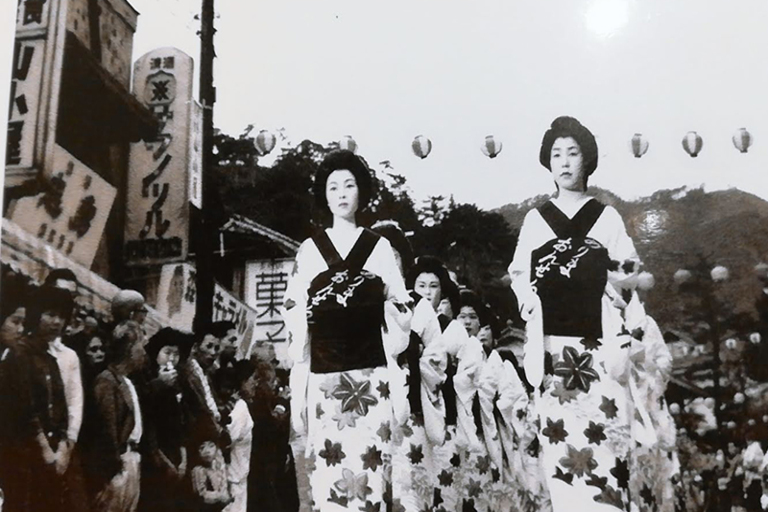
The geisha culture that still remains in Hyogo Prefecture at Arima Onsen
When the port of Kobe opened 150 years ago, many foreign visitors came to Arima Onsen. They built Western-style hotels and facilities, adding a unique blend of Japanese tradition and Western culture to the town. This mix has given Arima Onsen a distinctive, exotic atmosphere that attracts worldwide visitors.
The Waters of Arima There are two kinds of onsen at Arima Onsen: the Kinsen (金泉, "Gold Spring") and the Ginsen (銀泉, "Silver Spring"). The "Gold Spring" has a reddish-brown color and is rich in iron and salt, which is believed to be beneficial for relieving muscle pain and skin conditions. The "Silver Spring" is almost transparent with radium and carbonate, and is said to help with circulation and alleviate joint pains.
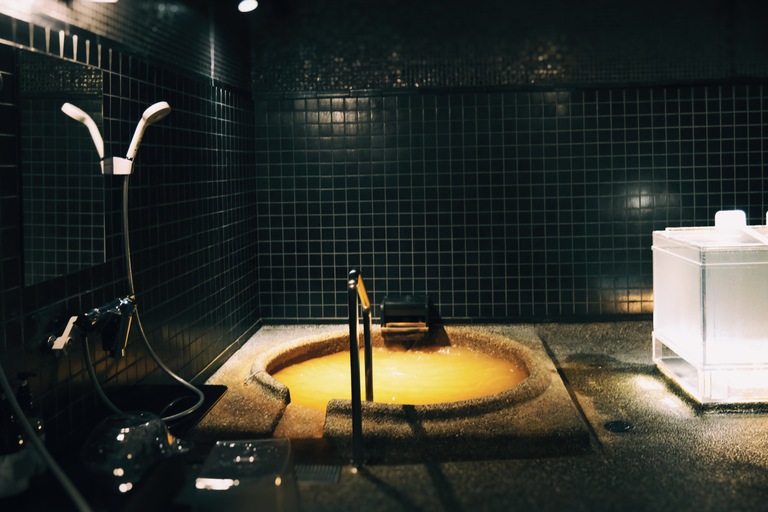
The "Gold Spring" onsen at Hotel Hanakoyado
You can experience these waters in various settings, from public baths to private ryokan onsens. If you prefer not to share a bath with someone else, I recommend booking a hotel with a private bath, which I did for my stay this time. Additionally, the traditional ryokan experience allows guests to soak in the onsen before enjoying a kaiseki meal, a conventional Japanese-tasting course.
Hotel Hanakoyado
I stayed at the hot spring hotel in Arima - Hotel Hanakoyado. It is quiet and comfortable, with a folk-like wooden setting that creates a tranquil atmosphere. Initially built in the 1940s, the hotel was thoughtfully renovated in 1999, blending traditional Japanese hospitality with modern amenities.

This hotel in Arima made me feel like I was time traveling
The accommodation has a retro feel, featuring nostalgic touches such as the famous statue of the dog Nipper with a gramophone sitting in front of the television screen.
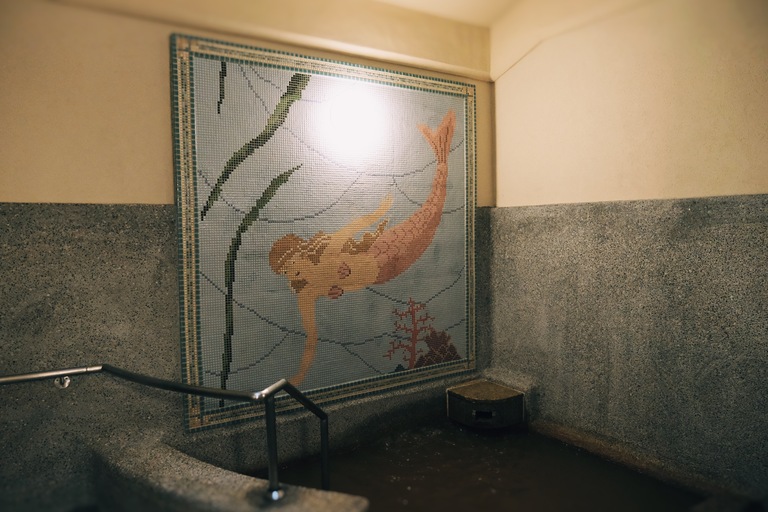
The cute design of one of the two private onsens
Hotel Hanakoyado offers Japanese and Western-style rooms with two private onsen and sauna facilities. Due to the traditional wooden structure and open design, sound can travel between rooms so that earplugs might be helpful for light sleepers.
A Step Back in Time
After checking in, I decided to stroll through the narrow streets of Arima Onsen before it got too dark. One of the perks of staying overnight is that, as evening falls, the town's lively atmosphere quiets down. Most day-trippers head home, leaving the streets much quieter for those of us spending the night. It's like having the town almost to yourself!
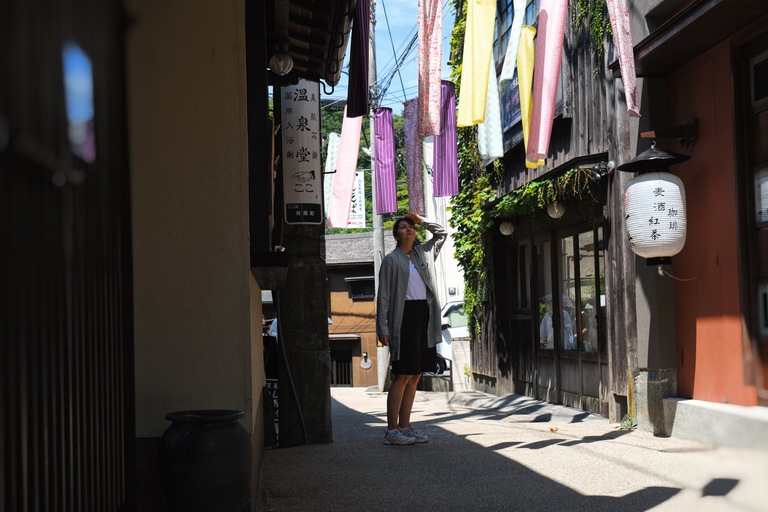
The quiet streets of Arima Onsen
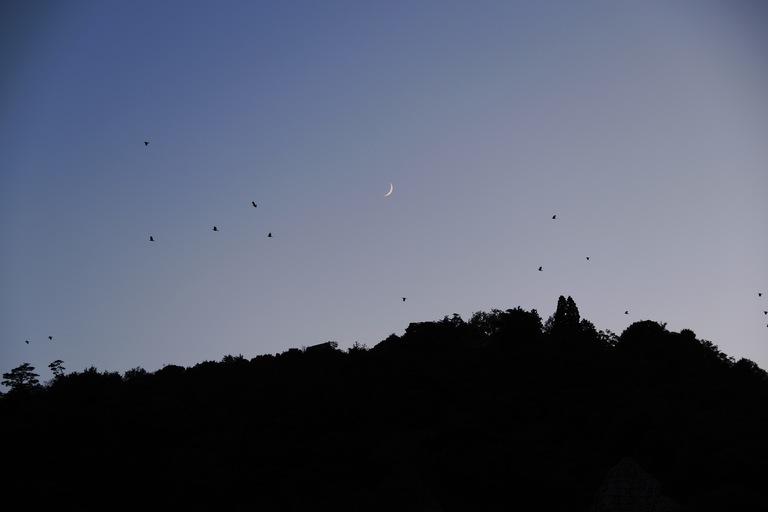
The nostalgic ambiance of the approaching night
Walking through Arima’s quaint town feels like stepping back in time. The narrow streets are lined with traditional wooden buildings, shops selling local crafts, and small eateries offering regional delicacies. Some areas are softly illuminated in the evening, adding to the nostalgic ambiance.
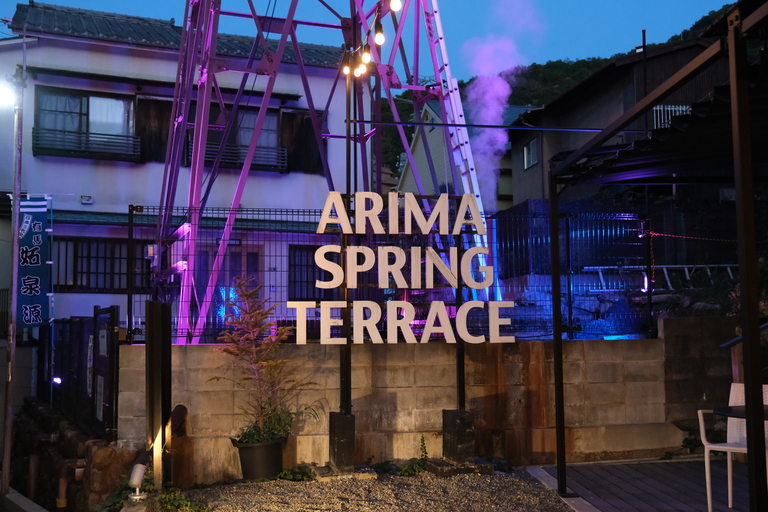
Illumination at Arima Spring Terrace
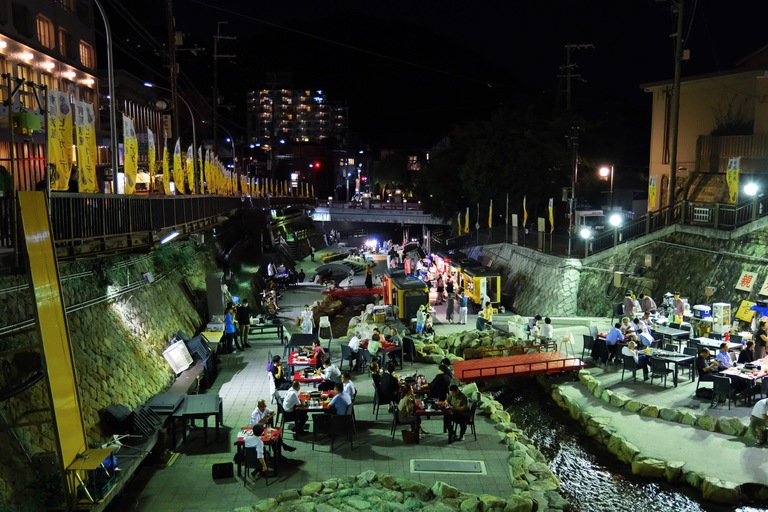
Beer Garden at Arima River Shinsui Park
In the central part of Arima Onsen, next the upstream of the Arimagawa River, you can find Nene-Bashi, which has an attractive red railing. Here, on the Arima River Shinsui Park, there are events such as the cherry blossom festival in spring and Beer Garden held during summer, with retaining food stalls accompanied by games for adults and children alike, along with a specific stage with dance performances by Arima geisha and live music.
The Natural Beauty of Mount Rokko
For those seeking a more leisurely experience, the Rokko-Arima Ropeway connects Arima Onsen with the top of Mount Rokko. The 12-minute ride offers panoramic views of the mountains and the distant Osaka Bay, making it a popular activity for visitors. I didn’t want to rush this time, so the next morning, I began my day by walking to the greenest part of the area: Tsuzumigataki Park.
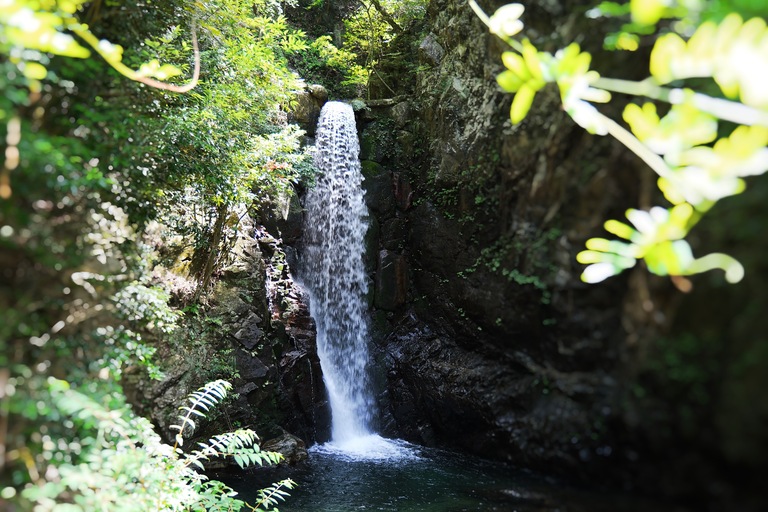
The waterfall at Tsuzumigataki Park
Named after the light, drum-like sound of water falling into the basin below, this park is perfect for a relaxing morning walk. The clear waters of the Rokko Mountains flow through, creating a tranquil atmosphere. I recommend this place during summer—it’s refreshing even on the hottest days!
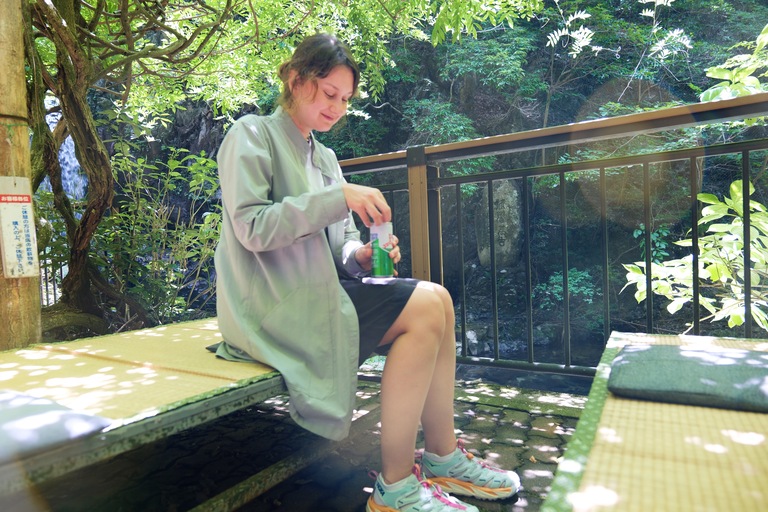
Trying to cool down after my morning hike
In the middle of the park, you will find a small tea shop where you can have a pleasant cup of tea or cold drink and sit to view the waterfall. Traditional Japanese sweets like oden and zenzai come with refreshments at the tea shop.
Cafes and Sweets to Try in Arima Onsen
Though the Arima Onsen area is rich in historical landmarks and buildings, offering a timeless atmosphere, many new establishments have emerged in recent years, bringing a fresh energy to the area while preserving its rich traditions.
Fish House Cafe
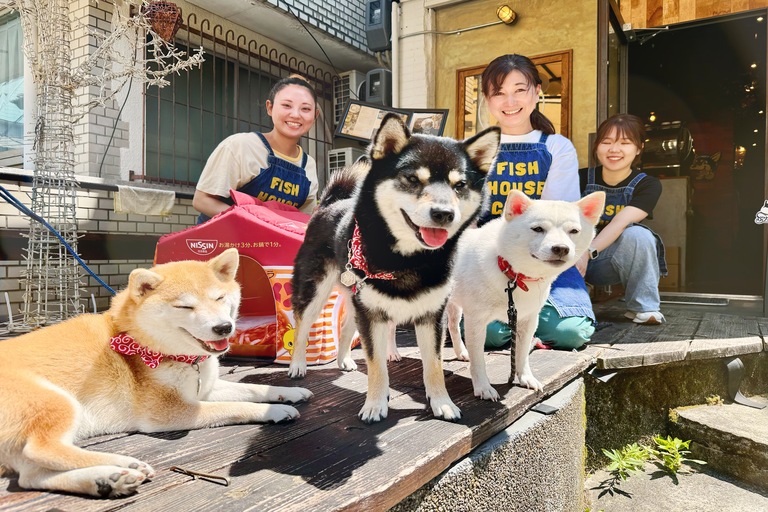
Welcome to the Fish House Cafe
One popular spot is Fish House Cafe, a modern cafe that adds a new dimension to the Arima Onsen experience. The cafe is home to three adorable Shiba Inu dogs, including the mascot, Fuku-chan, who often welcomes guests with an affectionate bark.
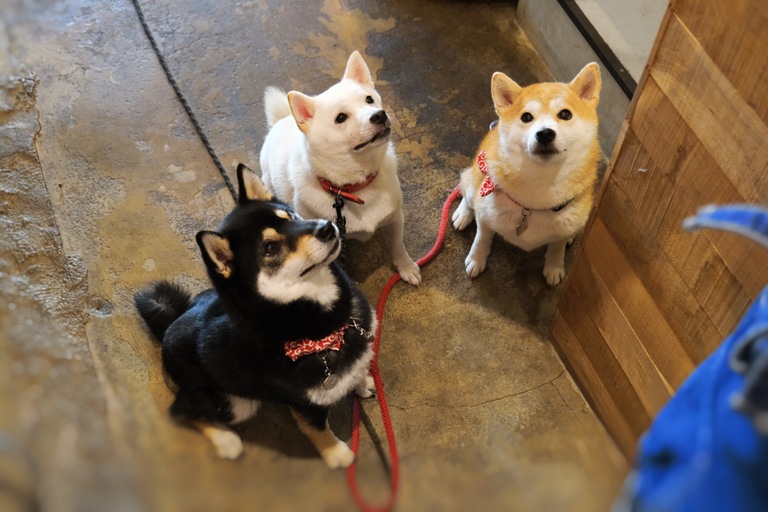
The cutest staff I've ever met!
As someone who has always wanted a dog, I can say this place is heaven! All three dogs roam freely around the cafe, occasionally stopping by tables to offer a friendly paw or simply observe as you enjoy your meal.
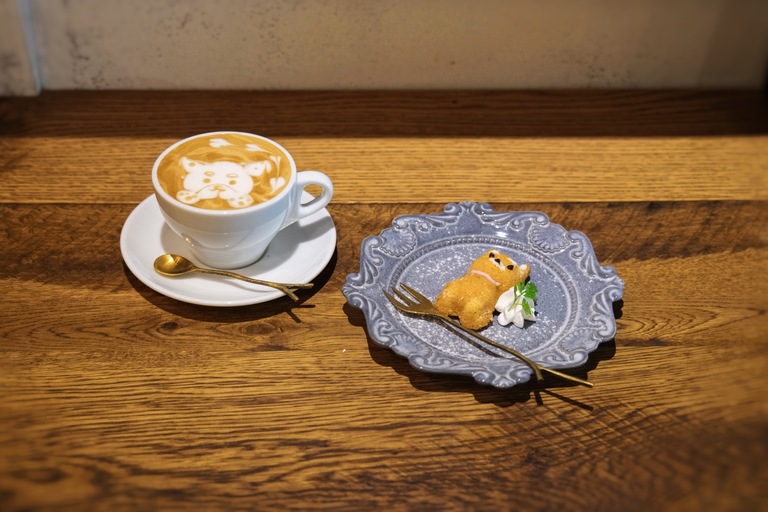
Shiba Inu-themed sweets and latte
The menu features a variety of delicious treats, including Taiwanese braised pork with keema curry, Shiba Inu-themed sweets, chocolate brownies, and wonderfully crafted latte art coffee drinks.
Mitsumori Honpo
If you crave a more traditional experience, visit Mitsumori Honpo. This shop, established over 120 years ago, offers hand-crafted carbonated senbei, a traditional Japanese cracker.
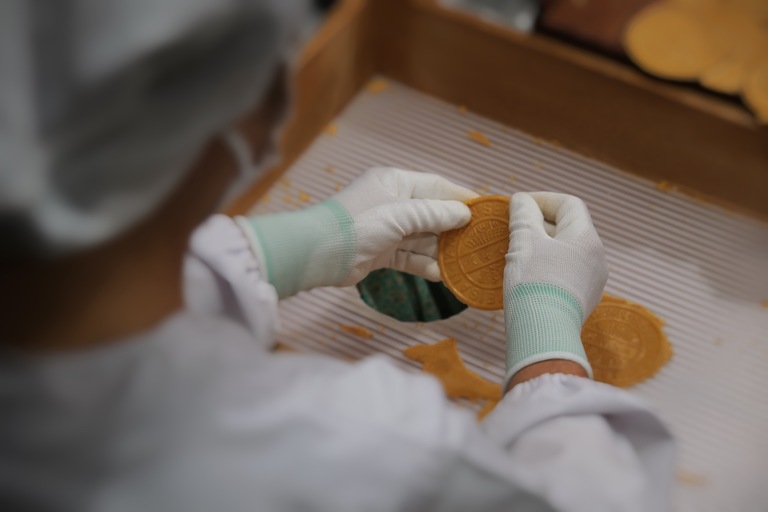
Famous carbonated senbei with a 120-year history
The history of Arima Onsen's carbonated senbei dates back to the late Meiji era (1907). Initially created for infants and older people, the sensei's simple ingredients—wheat flour, potato starch, sugar, salt, and carbonated water—make it a gentle and tasty treat.
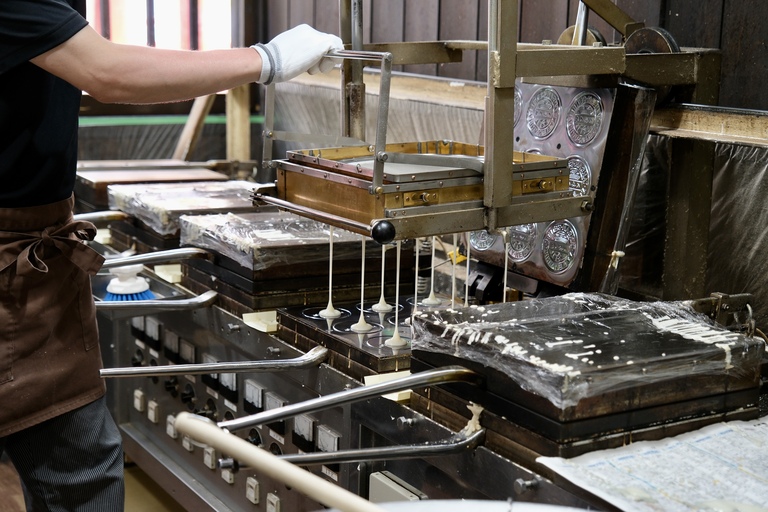
The traditional process for making senbei at Mitsumori Honpo
The process of making this senbei is as traditional as its history. Each cracker is carefully baked on thick iron plates, and the excess batter is meticulously trimmed by hand, ensuring that every senbei is perfectly crisp and light.
Arima Bouten Bécassine
Another must-visit is Arima Bouten Bécassine, which opened just a year ago and offers a contemporary twist to the traditional Japanese teahouse experience.
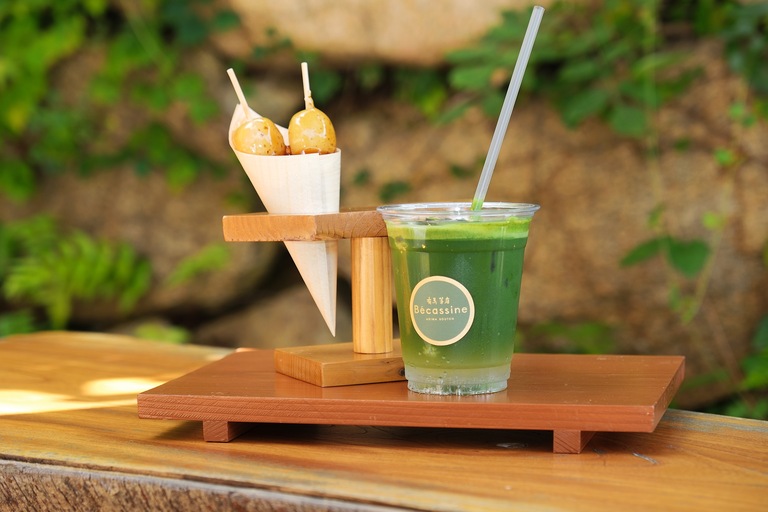
A café with a modern twist that serves matcha-based beverages
The café’s menu is centered on matcha-based beverages, including my favorite, the Matcha Arima Cider. This drink is a refreshing fusion of fizzy cider and the subtle bitterness of freshly whisked matcha, perfect on a hot day. To complement your drink, I highly recommend the Mitarashi Dango—a classic Japanese treat made of rice flour dumplings skewered on bamboo and glazed with a sweet soy sauce. The dango is served with a sprinkle of fragrant Arima Sansho pepper (you can also choose plain flavor), adding a unique and slightly spicy kick that enhances the savory-sweet flavor.
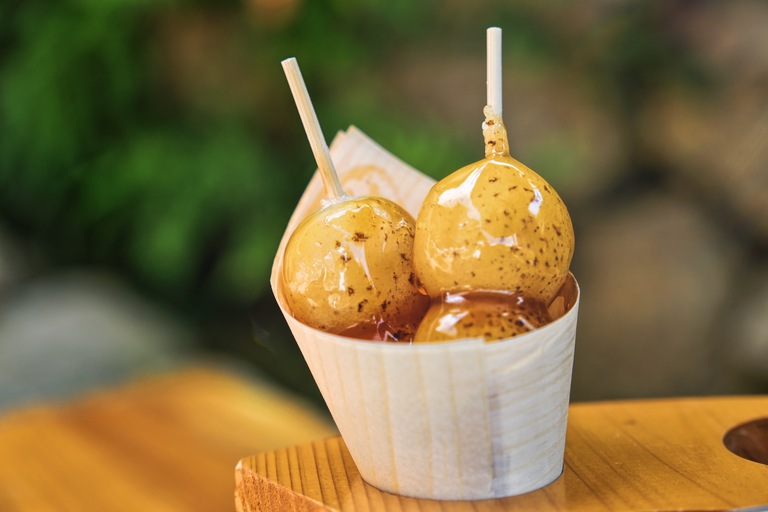
Perfectly grilled rice dumplings glazed in a sweet soy sauce
The café is a beautiful blend of traditional Japanese architecture and modern design. The terrace seating offers a picturesque view of the nearby temple, and the striking 2-meter-high thatched roof sculpture adds to the café’s distinct charm. Whether you visit in spring, summer, fall, or winter, you’ll find seasonal drinks and sweets that reflect the changing beauty of Arima Onsen.
Last but not least
This charming onsen town should be on your itinerary if you're planning a visit to Japan and want a quiet but memorable trip. Here, time slows down, so you can, step by step, allow yourself to forget your daily chores and problems and immerse yourself in Japan's timeless charm!
Date : 2024.09.06



